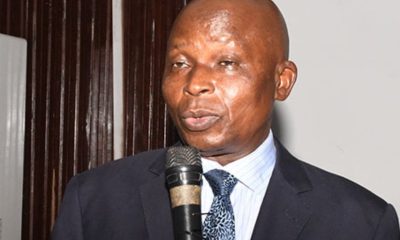Uncategorized
VW China head sees no evidence of rights violations at Xinjiang plant
Germany’s Volkswagen Group will continue to use its plant in China’s western Xinjiang region after finding no evidence of human rights violations in its operations there, a senior company official said.
“Of course, we are aware of the critical reports, we take this very seriously,’’ Ralf Brandstätter said.
Brandstatter, the head of VW’s China operations said about claims of systematic oppression of Muslim Uighurs in the western province and of forced labour in car production.
“But we have no evidence of human rights violations at this plant that has not changed after my visit,’’ he said.
Brandstätter travelled to the city of Ürümqi in mid-February to inspect the factory.
“I did not find any contradictions,’’ he said, adding that VW would continue to monitor the situation.
However, options to take any action are limited because a subsidiary of the joint venture not controlled by VW operates the plant with its Chinese partner SAIC, noted the German company’s external relations head, Thomas Steg.
The plant project in Ürümqi, which started in 2012, had catered to the high demand for cars in the region.
The situation changed over time, said Steg, in part because the Chinese government’s policy in the autonomous Uighur region had changed, for example after a terrorist attack.
Brandstätter took over as China boss last summer and at the beginning of this year said he would not tolerate forced labour, not even with suppliers or recruitment agencies.
Uncategorized
Court to deliver judgment in suit seeking use of TVCs to vote, March 10
The Federal High Court, Abuja has fixed March 10 to deliver judgment in a suit filed by two aggrieved Nigerians seeking the use of Temporary Voter Cards, (TVCs) in the general elections in the absence of the Permanent Voter Cards, (PVCs).
Justice Obiora Egwuatu fixed the date on Tuesday after parties adopted their final written addresses and made brief adumbration to convince the court on their positions.
Arguing on behalf of the plaintiffs, Mr Victor Opatola told the court that should the court rule in their favour, the Independent National Electoral Commission, (INEC) needed no special technology to allow people use their TVCs to vote.
He said this was because the content of the TVC was the same as the content of the PVC.
He said the only difference was the plastic used for the PVC adding that the BVAS required only a thumbprint or facial recognition so with the TVC, an eligible voter could also be allowed to vote.
He also said that judging from the just concluded elections where TVCs were used at some polling units, it was clear that the use of TVCs was possible.
Opatola prayed the court to grant the prayers of his client
For his part, counsel to INEC, Mr Abdulaziz Sani urged the court to dismiss the plantiff’s originating summons as an unnecessary suit.
According to Sani, no TVC was used anywhere in Saturday’s election as alleged by the plaintiffs.
The senior lawyer also told the court that all the claims of the plaintiffs had been debunked by facts provided.
He reiterated that the suit should be dismissed as unnecessary.
Having heard all arguments, Justice Egwuatu fixed March 10 to deliver judgment.
The News Agency of Nigeria, (NAN), reports that INEC had repeatedly held that only eligible voters with the PVCs would be allowed to vote in the 2023 presidential, governorship and parliamentary elections.
NAN also reports that the plaintiffs, Kofoworola Olusegun and Wilson Allwell in the suit filed on Feb. 8 and marked FHC/ABJ/CS/180/2023, are asking the court to determine “Whether by the true construction and interpretation of section 10(2), 12(1) and 47 of the Electoral Act 2022; Section 77(2) and 132(5) of the 1999 constitution (as amended), and bearing in mind that the Bimodal Voters Accreditation System (BVAS) machine introduced by INEC only needs the thumbprint and/or facial recognition to accredit a voter;
“Whether a person whose name appears in the electronic format in INEC’s central database and manual, printed paper based record or hard copy format of the register of voters and has been assigned a Voter’s Identification Number (VIN), can be said to be entitled to be accredited to vote with his/her TVC in the general election to be conducted by the defendant.
“Whether such a person can, as a consequence of the defendant’s inabilities, actions and omission be disenfranchised of the right and entitlement to vote in the 2023 general election.
The plaintiffs asked the court to grant the following reliefs should the questions be answered in their favour.
“A declaration that the plaintiff, having fulfilled all necessary legal requirements to register and having consequently been captured in it’s central database and manual, printed paper based record or hard copy format of INEC’s maintained register of voters, the plaintiff are entitled to vote using their TVC in the 2023 General Elections.
“An order compelling INEC to allow the plaintiff to vote using the TVC issued by INEC, the plaintiff having been duly captured in the national register of voter’s database.
“Any other order, the court may deem fit for all other Nigerians who are like the plaintiffs and have not gotten their permanent voter’s card, as the court may deem fit.
Uncategorized
Flights from Cologne, Dusseldorf airports resume after strikes
Flights resumed at Cologne-Bonn and Dusseldorf airports on Tuesday after workers returned from 24 hours of industrial action over pay.
At Düsseldorf airport, the strike ended at around 3 a.m. (0200 GMT), said Verdi spokesman Peter Büddicker.
He did not expect any further restrictions for passengers.
At Cologne-Bonn airport, staff resumed work at 6 a.m., according to a spokesperson, who added there could be delays while backlogs cleared.
Almost every flight was cancelled at the airports on Monday, due to the one-day strike called by the Verdi and Komba trade unions.
While 136 departures and arrivals were planned in Cologne-Bonn, only two took place – a flight to and from Vienna.
The airport would otherwise have expected around 15,000 passengers on Monday.
The strikes were part of larger industrial actions amid negotiations for public sector employees at the federal and local levels, as well as the nationwide negotiations for aviation security employees.
Unions are demanding 10.5 per cent more income, or at least 500 euros more per month.
-

 Business1 day ago
Business1 day agoSeplat Energy celebrates a decade of Dual Listing with Bell Ringing Ceremony at Nigerian Stock Exchange
-

 News1 day ago
News1 day agoBDCs now buying dollar at ₦980 — ABCON President
-

 Metro1 day ago
Metro1 day agoOsun Poly Student, Olanrewaju Olatona killed by hit-and-run one-way driver
-

 Headline1 day ago
Headline1 day agoFagbemi warns against obstructing EFCC from performing its lawful duty
-

 News1 day ago
News1 day agoLASG’s maize palliative impactful, says poultry association chair
-

 News1 day ago
News1 day agoWoman killed while crossing road in Anambra




